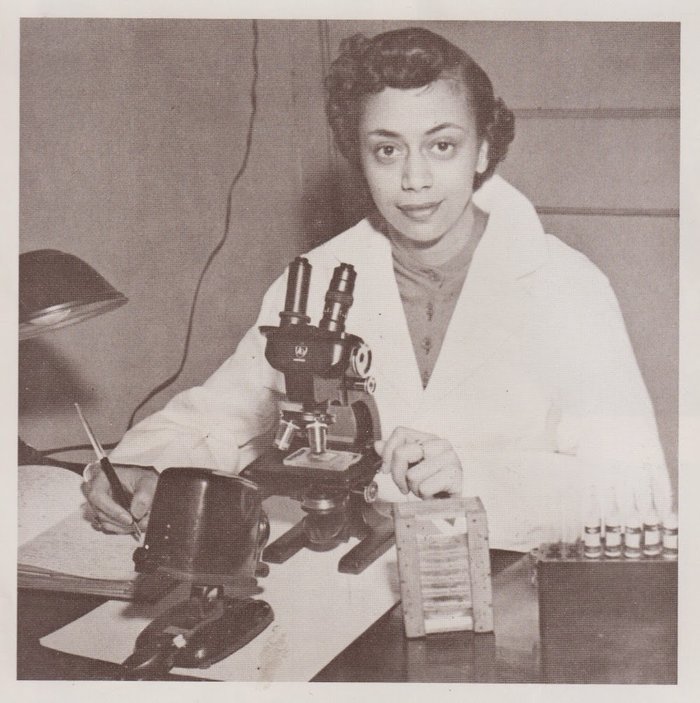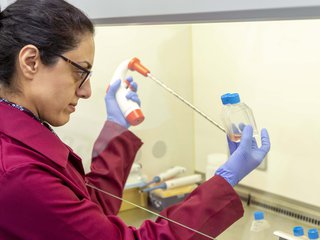Dr Jewel Plummer Cobb – cancer researcher and champion of equality
Dr Jewel Plummer Cobb was an African American cell biologist and physiologist whose crucial research led to the discovery of the effectiveness of the drug methotrexate in treating childhood leukaemia – a type of blood cancer. She later become a renowned professor, campaigning tirelessly for more equality in science and inspiring others to join the profession.

Dr Jewel Plummer Cobb. Linda Lear Center for Special Collections and Archives, Connecticut College
A look down the microscope was all it took...
Born in 1924 in Chicago, Jewel Plummer Cobb was the third generation in a family of medicine. Her father was a dermatologist and her grandfather had become a pharmacist after being freed from slavery.
Science and the success of African Americans was often a hot topic around the Cobb family dinner table.
While she'd initially wished to follow in her mother’s footsteps and teach physical education, Cobb’s fascination and dreams of becoming a scientist began in her high school biology class.
Taking a first look into a microscope she discovered an “awe-inspiring” new world.
Though this eye-opening experience swayed her towards following her family into a life of medical science, she preferred the research and theory behind diseases rather than patient care.
Battling discrimination in education
Cobb began at the University of Michigan in 1941 but only stayed for 3 semesters due to the racist conditions inflicted on African American students.
Dormitories were segregated, and black students were excluded from participating in the social activities arranged on campus.
I know I was at a constant disadvantage because I was both black and a woman, but I used that as a drive to work hard and succeed.
- Dr Jewel Plummer Cobb
In the face of this discrimination, Cobb eventually transferred to Talladega college, which was much more welcoming for non-white students. It was there she graduated with a degree in Biology.
She applied to New York University for a fellowship, but was rejected.
This was just another barrier for her to overcome. Rejection didn't deter her – Cobb visited the campus in person and insisted on presenting her ideas to the Biology faculty – who were highly impressed and decided to accept her application. It was here that she gained her masters and doctorate.
Trailblazing research with The Wrights
In the early 1950s, Cobb joined Harlem Hospital’s Cancer Research Foundation to work alongside surgeon and oncologist Jane Wright and her father.
They hoped to create a straightforward test to work out the specific doses of chemotherapy drugs needed to be prescribed to individuals who were undergoing cancer treatment.
While Jane Wright worked with her cancer patients’ diseases in vivo (in the body), Cobb worked in the lab with her trusty microscope, using time lapse photography to track the effects different doses of drugs had on cancer cells.
She became incredibly skilled in human tissue culture which she would then test in vitro (in the lab, outside the body). The results of their experiments were extremely valuable contributions for future scientists to build on in cancer treatment.
I was raised to believe no career was out of bounds.
- Dr Jewel Plummer Cobb
In the 1960s Cobb and Wright’s most notable discovery was that that methotrexate (used to slow cancerous cell growth) was effective in treating skin and lung cancers and childhood leukaemia.
This wonder drug is commonly used today to treat leukaemia, lymphoma and many other different cancers.
A lasting legacy of fighting for equality
Leaving lab life behind in 1969 Cobb went onto have a fruitful career in teaching and administration until 1990. She became president of California State University at Fullerton – the first African American woman to ever hold this post.
The university thrived with Cobb at the helm and she worked tirelessly to improve diversity and create opportunities for young people, ethnic minorities and women to pursue careers in science and medicine.
Cobb died in 2017 aged 92 with 21 honorary degrees in her name. Her contribution to cancer treatment and personal motto of “Goals are what drives us forward” live on and continue to inspire the science world.
“I’d like to be remembered as a Black woman scientist who cared very much about what happens to young folks, particularly women, going into science.
- Dr Jewel Plummer Cobb

Because we've been beating blood cancer since 1960
We’re a community determined to beat blood cancer. We do this by funding research that takes us closer to a cure.
